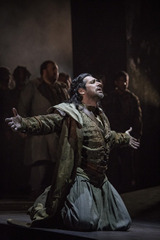| Opera Reviews | 26 April 2024 |
Attila opens the Teatro Comunale's seasonby Silvia Luraghi |
|
| Verdi: Attila Teatro Comunale di Bologna 23 January 2016 |
|
|
The libretto is quite challenging for the director, as the intentions of the various characters involved are quite changeable, and often obscure to the others. The opening of the second scene of the prologue features the foundation of Venice by a group of refugees from Aquileia, a scene which Solera was clearly fond of, but was not in the original drama, and does not help the theatrical aspects of this opera. The production, directed by Daniele Abbado, has been co-produced with Palermo’s Teatro Massimo and Venice’s La Fenice. Set and lighting designer Gianni Carluccio offered a vaguely outdoors setting, dim and forsaken, pointing towards the harsh and ambiguous relations between the Romans and the barbarians. The Roman soldiers wore long military coats, the barbarians were more casual as appropriate, and as refugees the people from Aquileia wore the first thing they could grab before fleeing from home. Odabella in male attire rebeled against Attila while trying to keep calm her jealous lover Foresto. There was a single break between the first and the second act, but unfortunately the action and the music were interrupted by frequent scene changes, even though not much actually changed, which had a quite adverse effect overall. Giovanna and even more, Attila offer a challenging score for singers, especially for the soprano, whose tessitura requires perfect mastering of the whole range. Bass Ildebrando D'Arcangelo in the title role had a slow start, but then offered an authoritative portrait of the barbarian chief. Maria Josè Siri was a very temperamental Odabella, with some problems in the lower range of her voice, especially noticeable in her cavatina in the prologue. Tenor Fabio Sartori is a very solid Verdi singer, and his performance was up to expectations in spite of a slight hesitation in the passaggio in his famous aria “Ella in poter del barbaro”. Baritone Simone Piazzola was an impressive Ezio, with a ringing, handsomely colored voice, very good technical skills and lexcellent breath control. The chorus, which participates at several crucial moments in this opera, was very well instructed by chorus master Andrea Faidutti. Michele Mariotti, the company’s music director, gave a stylish reading of Verdi’s score, and the orchestra played with commitment. At the end, all the singers enjoyed a cheerful success, with a real ovation for the Maestro, and some slight dissent directed to the production team.
|
|
| Text ©
Silvia Luraghi Photo © Rocco Casaluci |

 After La Scala’s opening with Giovanna d’Arco, Bologna’s Teatro Comunale also opened its new season with an early and lesser performed Verdi title. Attila was written by the composer only a year after Giovanna, again in collaboration with librettist Temistocle Solera, although the libretto was left incomplete by Solera and finished by Verdi’s most faithful librettist, Franceso Maria Piave.
After La Scala’s opening with Giovanna d’Arco, Bologna’s Teatro Comunale also opened its new season with an early and lesser performed Verdi title. Attila was written by the composer only a year after Giovanna, again in collaboration with librettist Temistocle Solera, although the libretto was left incomplete by Solera and finished by Verdi’s most faithful librettist, Franceso Maria Piave. 





